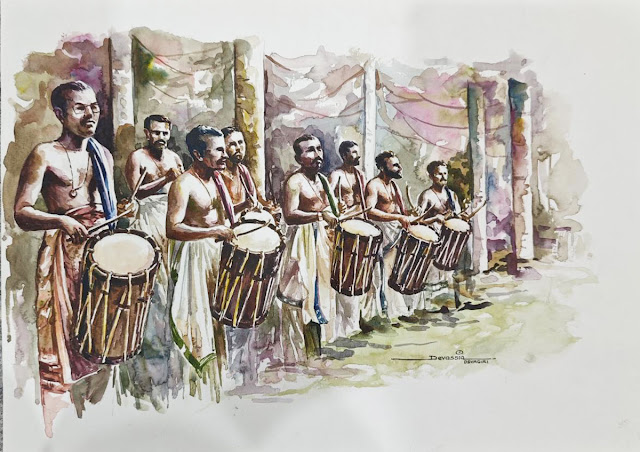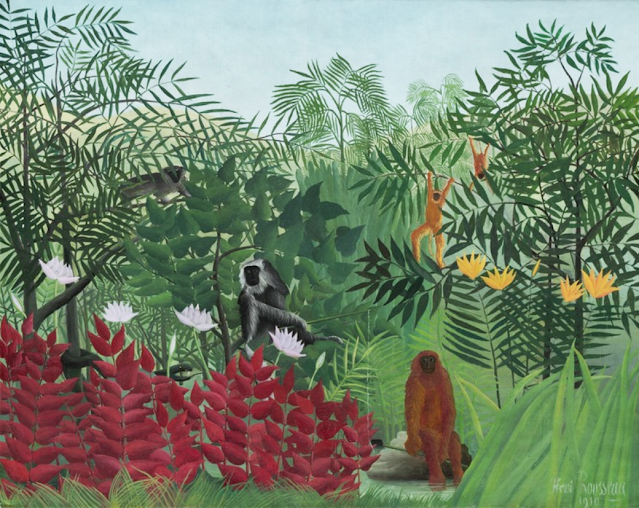NaPoWriMo: Today, we’d like to challenge you to write a poem inspired by Wallace Stevens’ poem, “Peter Quince at the Clavier.” It’s a complex poem that not only heavily features the idea of music, but is structured like a symphony. Its four sections, like symphonic movements, play with and expand on an overall theme, using the story of Susannah and the Elders as a backdrop.
Try writing a poem that makes reference to one or more myths, legends, or other well-known stories, that features wordplay (including rhyme), mixes formal and informal language, and contains multiple sections that play with a theme. Try also to incorporate at least one abstract concept – for example, desire or sorrow or pride or whimsy.
 |
| Ahalya by Raja Ravi Varma |
I have chosen Ahalya's story here (a brief story is below the poem), one of the Panchakanya's (or the Five Maidens - powerful women from the epics of Ramayana and Mahabharatha). Symphony of Ahalya is a retelling of one of Indian mythology’s most enigmatic women — not merely as a cautionary tale, but as a meditation on beauty, desire, silence, and redemption. Through four poetic movements, this piece reimagines Ahalya’s journey: from divine creation to betrayal, from cursed stillness to awakening. Interweaving classical myth with contemporary voice, it explores how narratives shape women, how silence holds truth, and how rising is sometimes the most radical form of grace. This is not just her fall — it’s her song, her stillness, her becoming.
Day Twelve: NaPoWriMo: Symphony
of Ahalya: The Silence, the Song
The Moonlight (The Making)
Desire - The birth of beauty and the
gaze of gods
In dust, she dwelt not — no,
divinely carved,
By Brahma’s thought, from dream unmarred.
Ahalya — not born, but breathed, like flame,
A name that even silence spoke in shame.
O sculptor-sky, what form you chose!
A woman shaped of hush and rose.
She walked, and echoes bowed in grace,
Too fair to fall, too soft for space.
“She ain’t just pretty, bruh, she’s
poetry on feet,”
said a nymph in a whisper, trying not to repeat.
“But careful — desire makes gods go blind,
even sages forget the time they bind.”
Indra saw. Indra sighed. Indra
schemed.
The king of clouds grew clouded, it seemed.
“One form. One face. One
night."
And pride forgot what was wrong or right.
The
Mirror Masquerade (The Fall)
Pride - The illusion, the trespass,
the cost
He knocked in silence, in another’s
skin,
Gautama's guise — a borrowed sin.
Ahalya blinked, her breath held tight,
What’s false in fog can feel like light.
He spoke as a sage, but his
voice had lilt,
A honey-slick tone with just enough tilt.
“I
return early, my love, no vow betrayed...”
And though the soul stirred — the heart obeyed.
Rhyme turned rust. Lust stole hush.
The dawn broke not with light — but crush.
Gautama came with time in hand,
Saw truth stretch thin on the holy land.
“Stone
you shall be — till the breath of right,”
he roared, and the earth turned off her light.
But was it wrath? Or was it grief?
His pride dressed clean what felt like a thief.
And Indra — feathered, fractured, shamed —
Wore a thousand eyes where once he aimed.
Stone
Sonata (The Stillness)
Sorrow - Ahalya’s silence and the
passage of time
Time tiptoed past — no tears, no sound,
She stood, not buried, not burnt — but bound.
A monument to misplaced trust,
A hymn of flesh turned to dust.
Yet in that stillness, thoughts ran
free,
Like rivers under a rock, unseen at sea.
“Was it weakness? Was it will?
Was the lie so sweet, or the silence so still?”
Words unspoken echoed inside,
Regret — her constant, watchful bride.
Her sorrow was not just the loss of
name,
But being known only by her shame.
The
Touch of Truth (The Awakening)
Redemption - The return of light,
redefinition of self
Then came Rama, with his bow of
time,
His silence louder than all crime.
His feet brushed dust — and stone took breath,
Ahalya stirred from the kiss of death.
She woke not in weakness, but in
knowing.
Not in ruin, but in growing.
“They made my tale, they made me
test,
But now, I rise — no curse, no jest.”_
Rama said nothing, for nothing was
due.
No blame, no shame, just morning dew.
Her stone was shed like yesterday’s
skin,
She stepped from stillness, whole within.
And all who watched, in court or
sky,
Learned not of fault, but how grace can lie
In holding sorrow without disguise —
And choosing still to rise.
AHALYA: The tale of Ahalya is
primarily found in the Bala-kandam of the Ramayan by sage Valmiki. Ahalya was a
princess from the Puru Dynasty and was the wife of the great sage Gautama.
Ahalya's
beauty was besotted by Lord Indira who was intent on seeking her companionship. Indra disguised himself as Gautama and Ahalya allowed Indra into her home.
Gautama returned from his prayer to discover the misdeed. In addition to
cursing Indra, he cursed Ahalya to turn to stone. The curse was to be absolved
only when Sri Rama entered the precincts of the ashram. The curse of Ahalya is
finally absolved when Sri Rama visits the ashram of Gautama before he reaches
Mithila accompanied by the great sage Vishwamitra and his brother
Lakshmana. (Google Arts and Culture)




.jpg)







-Goya.webp)

